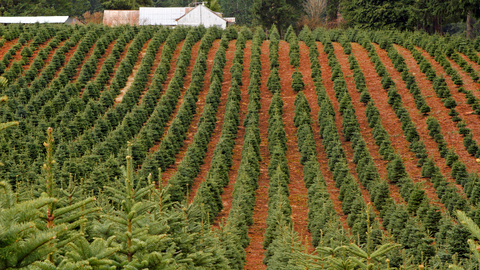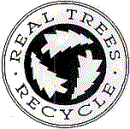Christmas trees: is artificial better than real?

Which Christmas tree is better: artificial or real?
There are benefits to both.
Artificial Christmas trees
For some, fake Christmas trees are the only option. Many apartment buildings, for instance, ban real trees.
Most artificial trees sold today are made from PVC (polyvinyl chloride). An artificial tree will last for years if properly stored. Although made of plastic, not all trees are recyclable. The majority of artificial Christmas trees on the market are imported from China; there have been recent concerns about the amount of lead in the trees. Lead is used as a PVC stabilizer. Studies have shown that a significant amount of lead dust settles beneath the tree, especially as the tree ages.
While 85% of trees are made in China, it is easy to find lead-free artificial trees made in the USA. American made trees tend to be manufactured with barium instead of lead. Ask your salesperson and read labels to find out which materials were used to make the tree. The average life span of an artificial Christmas tree is 7-8 years.
Pre-lit artificial trees are nice if you don’t mind the having the same color scheme each year. You avoid the hassle of untangling lines of twisted lights, but you’re stuck with the same clear or colored lights from year to year. Changing a burned out bulb on a pre-lit tree can be a hassle.
Save on your holiday electric bill
LED, or fiber-optic, trees are a popular choice. A fiber optic Christmas tree uses fine strands of glass or plastic with reflective coating to channel LED light. The effects are stunning. Both clear and colored lights are available. In addition to beautiful lighting effects, fiber-optic Christmas trees use 1/10 the electricity of a standard light bulb.
You can find a variety of fir and pine look-a-likes. Whether your space is large or small, there is an artificial tree made to fit. Trees range from three feet to twenty or more feet, and the diameters vary from wide to skinny.
There is also a growing market for outdoor artificial Christmas trees.

Storing and cleaning your Christmas tree
To store your tree, place it in a tree storage bag or in its original carton. To increase the life span of your artificial tree, store it in a cool and dry place. A damp basement or hot attic will age the plastic over time. If your tree is flocked, these conditions are particularly bad.
If you unpack your tree to find it covered with dust or dirt, don’t worry. You can clean the tree by simply blowing away dust with a hairdryer set on cool. Then, wipe down the tree with a damp cloth. It is best to use plain lukewarm water to wipe down the needles.
Real Christmas trees: the natural choice
According to the National Christmas Tree Association, there are 25-30 million real Christmas trees sold every year in the U.S. The smell of a fresh cut pine at Christmastime can’t be beat, especially when it’s mingled with the scent of your fresh baked gingerbread.
Feeling guilty about the environmental impact of using a real Christmas tree instead of artificial? Don’t! Natural Christmas trees are overwhelmingly preferred by environmentalists.
When you buy a natural, real Christmas tree, you are not killing an old-growth pine. Real Christmas trees are farmed. That’s right: Christmas trees are a crop.


Real Christmas trees are better for the environment
Artificial trees are made from petroleum-based (crude oil) plastic. Tree farms, on the other hand, have a positive effect on our environment. As the trees grow, they produce oxygen while absorbing carbon dioxide. They are “carbon sinks”, filtering pollution from the air.
Christmas tree farms are often located in areas that are not fit for growing other crops to maximize land use. The trees serve as soil stabilizers, preventing erosion. They also provide a great environment for wildlife.
For an even bigger punch, buy an organically-grown tree. Organic tree farms do not use pesticides. As the demand for organic tree farms grows, their numbers are increasing nationwide. You may very well have one in your local area.
Still not comfortable with a real Christmas tree? No problem. Instead of buying a cut tree, buy a live tree that can be replanted in your own back yard.
Consider this too: artificial trees will remain in landfills for hundreds of years after they are discarded. Real Christmas trees are biodegradable. Keep in mind that both real trees and some types of fake trees can be recycled. Check your community to see if there are any recycling programs. Real trees are often mulched, or placed in wildlife habitats where they provide shelter for animals while they decompose into compost.
Christmas tree farms are replenished constantly. For each tree harvested, 2-3 new seedlings are planted.
Even more good news about real Christmas trees
According to the Smithsonian, tree farms provide more than 100,000 American jobs, including growers and sellers. Local economies benefit from the natural Christmas tree industry. You can find Christmas tree farms in all 50 states and Canada.

Care for your tree
Whether you choose artificial or a real, there are several things you can do to maximize your tree:
- Keep it cool. Warm temperatures will affect both types of tree.
- Limit lighting time. Except for LED, most lights create enough heat to damage needles if left lit for extended periods of time.
- Don’t leave a lit tree unattended. Contrary to general belief, artificial trees are flammable.
- Water frequently. Your natural tree needs lots of water. Watering extends the life of the tree to as much as five weeks and prevents needle drop.
Enjoy your holiday season!
- Christmas Tree Farms, Tree Lots, Hayrides, Sleigh Rides and Other Winter Fun
Find a tree farm near you! This website is organized by state. It lists choose-and-cut your own Christmas tree farms, pre-cut tree farms, tree lots sleigh rides, and other winter fun activities, resources and info for Christmas holiday events.

- National Christmas Tree Association
Visit NCTA for more information about natural real Christmas trees - Find Recycling Centers and Learn How To Recycle
Guide to local resources including recycling centers, how to recycle, pollution prevention and how help protect the environment.










